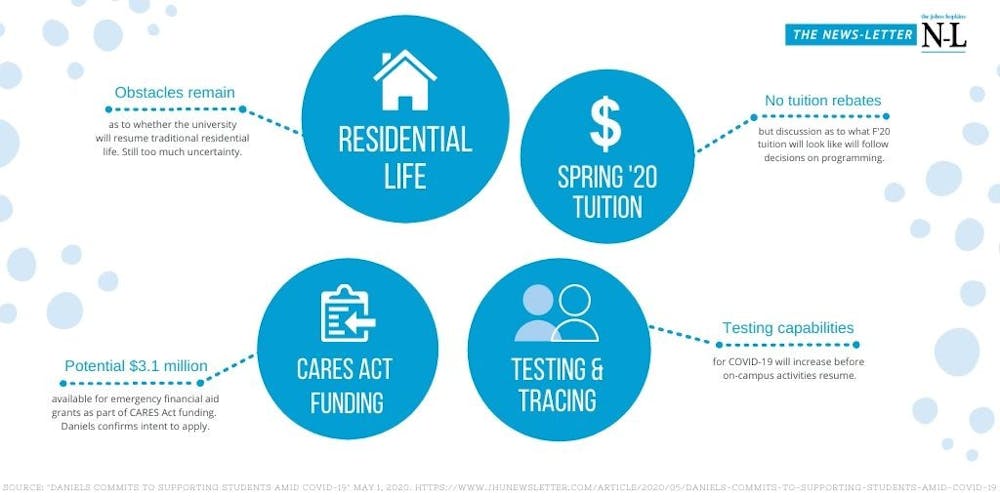In an interview with The News-Letter on Wednesday, University President Ronald J. Daniels stated that Hopkins will “almost certainly” apply for the $3.1 million of the Coronavirus Aid, Relief and Economic Security (CARES) Act funding available to it.
“We regard that as a responsibility that we have to apply for that funding and to provide that funding to our students with financial need,” he said. “Given that those funds have been earmarked for our students, we’re anxious to be able to secure those funds and to get them out to our students.”
The CARES Act funding is meant to provide emergency financial-aid grants for students experiencing hardship related to the ongoing coronavirus (COVID-19) pandemic. Daniels explained that these grants will not substitute but instead supplement existing emergency aid from the University.
The University is still deliberating with legal counsel, he said, over whether or not to apply for the second tranche of the CARES Act funding. If they were to apply for it, he indicated that some portion of the money would also likely go toward emergency financial support for eligible students.
At this time, Daniels added, the University does not currently plan to adjust students’ spring tuition.
“At this point, we’re pretty firm in our resolve that we’re not going to do tuition rebates,” he said. “We recognize that the experience has changed. But fundamentally the University is providing the core academic program and a lot of the supports around that program, whether it’s career counseling, mental-health supports and so forth.”
Daniels said it is not yet possible for the University to make a decision about tuition levels for the upcoming academic year. According to Daniels, too much about what the University will be able to provide for students next year remains uncertain.
“The decision as to what, if any, modifications are made to the tuition levels will really turn on what kind of experience we anticipate providing,” he said. “The decision around tuition will follow from that.”
The University, Daniels said, remains deeply committed to providing students with the traditional residential academic experience in the fall, to the extent that it can.
However, he added, health and safety challenges may ultimately make it too risky to resume on-campus University life as it was before.
“Life is going to be very, very different if we resume our activities in-person on-campus, and we don’t have... a widely vaccinated population,” he said. “We’re going to have to continue to some degree to maintain social distancing, to worry about infection outbreaks, to look at the role for contact tracing. All of those things constitute a sea change in the way we deliver our program.”
Daniels referenced a report authored earlier this month by Executive Vice Provost for Academic Affairs Stephen Gange and Vice Provost and Chief Risk and Compliance Officer Jonathan Links. Titled “What Does Return to Campus/Resumption of On-Campus Activity Look Like?”, this report outlines the different challenges that the University should be prepared to face before reopening and presents possible responses.
One thing that the authors of the report urge the University to be sure to communicate to students, faculty and staff is that nothing can be done to truly eliminate the risks that will come with reopening the campus.
“JHU will... need to acknowledge that the ‘safest’ thing we all could do would be to stay home, and that everyone who reengages in work and school has to accept some at least low level of risk in reengaging, albeit with as much risk reduction as is feasible,” they wrote.
Daniels noted that the University is planning for the possibility that students bring COVID-19 onto campus when they arrive. He explained that there was an increased likelihood that infection would occur when students returned to campus.
“Our response to these will be to try and find those infection pockets as soon as possible and respond to them,” he said.
As such, Daniels explained that the University plans to invest in testing and tracing the spread of COVID-19, in addition to ramping up testing capabilities, before on-campus activities resume. He stressed the necessity of being able to perform regular randomized testing of healthy workers, faculty members and students to limit chances of widespread outbreaks.
Daniels stated that the University plans to begin their testing and tracing capabilities in order to allow on-campus activities to resume. He noted that the administration is presently prioritizing the gradual resumption of lab-based research activity.
Daniels also expressed the challenge of communicating decisions in the time of COVID-19. He stated that, rather than obscure the spread of information to the undergraduate community, the University is doing its best to make measured decisions in a context of heightened uncertainty.
“Uncertainty about the pace of the spread of the infection. Uncertainty about its impact on different populations. Uncertainty about what is required to best mitigate that spread. Uncertainty about the efficacy of certain measures that we’ve taken and whether they’re ultimately going to be efficacious,” he said.
Daniels added that in the future, the University may communicate while they are in the process of decision-making instead of only after they have reached a solution.
“If there are cases where... we just haven’t worked it through, maybe what we have to be doing is communicating more effectively why we haven’t made a decision, what the factors are that are going to go into that decision, and perhaps a process,” Daniels said. “Maybe that’s a way to deal with this new normal of pretty profound uncertainty across a number of our operations.”





